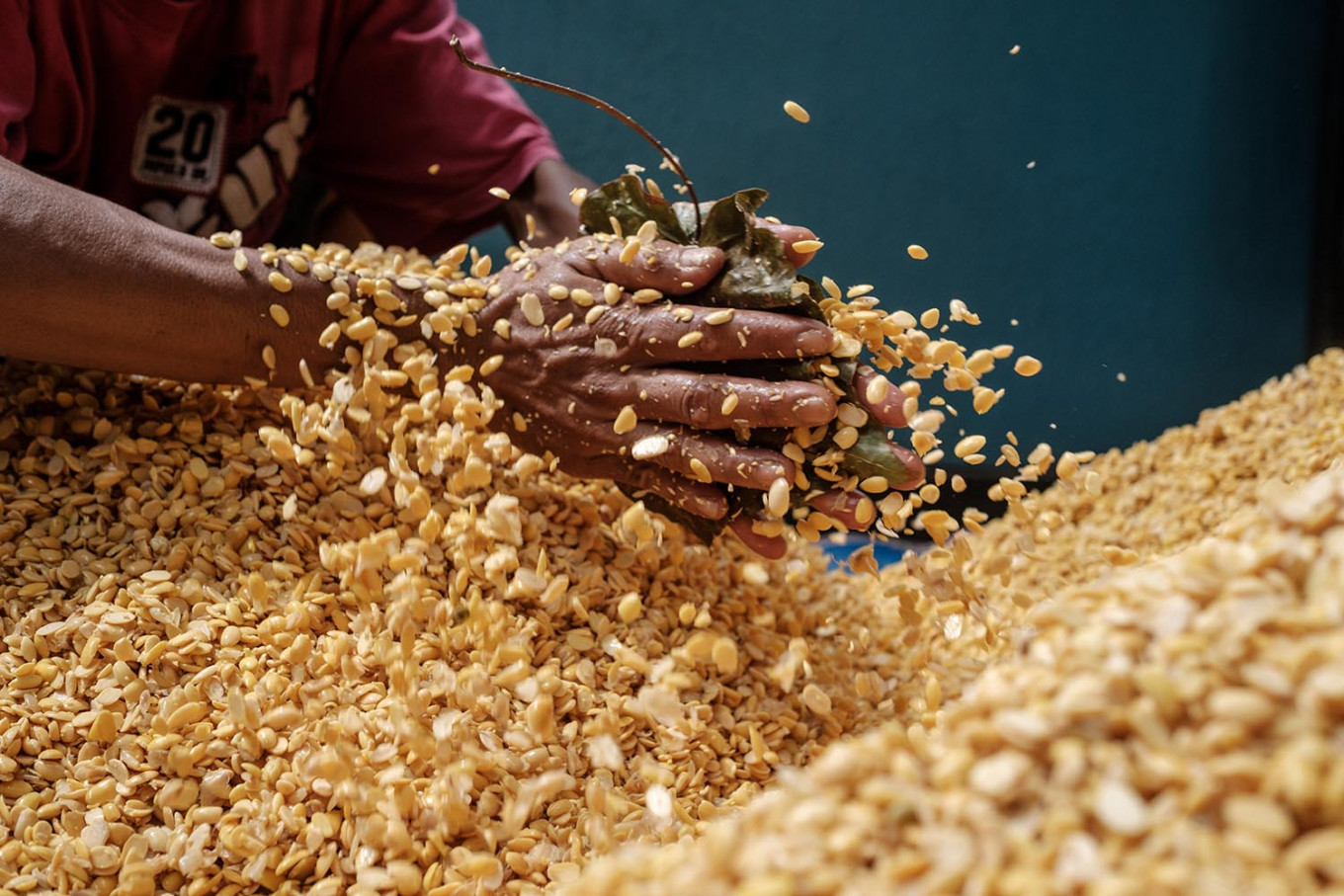Popular Reads
Top Results
Can't find what you're looking for?
View all search resultsPopular Reads
Top Results
Can't find what you're looking for?
View all search resultsSoy importers reject government’s price ceiling
Soybean prices hovered between $13 and $14 per bushel so far this year, compared to between $8 and $9 per bushel in the first half of 2020, according to Business Insider data.
Change text size
Gift Premium Articles
to Anyone
S
oybean importers are refusing to implement a government-ordered price ceiling as soaring United States soybean prices leave the Indonesian tempeh and tofu market in a state of flux.
Indonesian Soybean Importers Association (Akindo) chairman Yusan said on Jan. 20 that the Agriculture Ministry’s price ceiling of Rp 8,500 (61 US cents) per kilogram was not profitable compared to the average Rp 9,500 per kg that members paid to import the commodity.
Thus, only two importers, publicly listed PT FKS Multi Agro and PT Gerbang Cahaya Utama (GCU), have implemented the price ceiling thus far.
“This market operation to cap prices actually burdens importers. It does not make sense,” Yusan told lawmakers of Commission IV, which oversees agriculture, at a House of Representatives hearing in Jakarta.
Read also: Tempeh tipped as Indonesia’s next big export to United States
He added that imported soybean prices were also being bumped up by high international freight costs amid a global short supply.
The importer’s statement hits back at the Agriculture Ministry’s efforts to suppress soaring imported soybean prices that culminated in a shortage of tempeh and tofu – two staple Indonesian side dishes – as the Association of Tempeh and Tofu Producers Cooperatives (Gakoptindo) carried out a work strike from Jan. 1 to 3.
The producers almost entirely rely on US-sourced soybeans, prices of which have soared since August 2020, mainly driven by rising demand from China, the world’s biggest soybean importer, and by supply setbacks in Brazil, one of the world’s biggest soybean exporters, due to bad weather.
Soybean prices hovered between $13 and $14 per bushel so far this year, compared to between $8 and $9 per bushel in the first half of 2020, according to Business Insider data.
Gakoptindo chairman Aip Syarifuddin said producers struck a balance this month after tempeh sellers, most of whom work in traditional markets, agreed to buy the product at roughly 20 percent higher prices at Rp 15,000 per kg after the strike.
“Our [market] culture is familial. Leaving products at the market is like leaving them with family. We were making losses, some buyers understood, some did not. So it was difficult for us to raise prices. So we got together and arranged a work strike,” he said.
However, Gakoptindo, which claims to represent some 160,000 producers, ranging from small to big businesses, expects US soybean prices to continue rising until May this year.
“If the prices go up again, we’ll be baffled again,” said Aip.
Read also: How to escape from the soybean import trap
The United States Department of Agriculture (USDA) expects soybean prices to average $11.15 per bushel this year, “its highest level since 2013/14”, due to brisk demand – both abroad and at home – and due to a 1 percent decline in expected output to 4.135 billion bushels this season.
Previously, Agriculture Minister Syahrul Yasin Limpo promised three solutions in response to the strike. Firstly, the Rp 8,500 per kg price ceiling on soybeans for the first 100 days of 2020, or until April, and secondly, pushing local farmers to raise soybean yields in the first 200 days, or until July.
“Most of our people are tempeh and tofu eaters so this must not be a problem. We will immediately conduct concrete steps to stabilize prices. Hopefully, the price stability will not just happen in Java but in other regions too,” he said at a ceremony attended by representatives from Akindo and Gakoptindo in Jakarta on Jan. 7.
Thirdly, Minister Syahrul pledged to eventually stop Indonesia’s soybean imports, a goal that aligns with President Joko “Jokowi” Widodo’s promise to achieve nationwide “food self-sufficiency”, but that contradicts Statistics Indonesia (BPS) data that show soybean import volumes have steadily risen since 2010.










